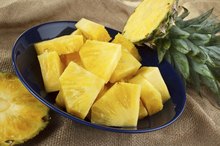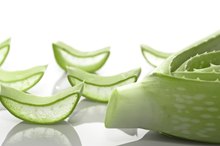Liver Damage & Tropical Fruit
The liver is the second largest organ in your body. It processes the food and drinks you consume into essential nutrients, and also filters out harmful or toxic substances from your blood. Tropical fruits such as bananas, pineapples, guava, mangos and lemons grow in warmer climates. While these fruits do not cause liver damage, you may need to avoid certain minerals that occur in these fruits if you already have a liver disease.
If you are experiencing serious medical symptoms, seek emergency treatment immediately.
Liver Damage
Many different problems or diseases can cause liver damage. Some conditions are genetic and others result from chemicals and toxic substances. Different conditions can cause liver damage, including hepatitis, cirrhosis, cancer and parasite infection. Symptoms of liver damage include:
- yellowish skin
- abdominal pain
- itchy skin
- dark urine
- chronic fatigue
- nausea
- tar-colored stool
- loss of appetite
Several factors can increase your chances of developing liver damage, including heavy alcohol use, diabetes and certain medications.
- Many different problems or diseases can cause liver damage.
- Different conditions can cause liver damage, including hepatitis, cirrhosis, cancer and parasite infection.
Pineapple
Sources of Nickel in Your Diet
Learn More
Pineapple is a tropical fruit that contains a trace mineral known as manganese. Your body needs manganese for various physiological processes. However, too much manganese can cause toxicity. A 1/2-cup serving size of raw pineapple chunks contain 0.77 milligrams of manganese. Adults should not consume over 11 milligrams of manganese per day, according to the Linus Pauling Institute 2. People with chronic liver disease are at a higher risk of manganese toxicity because their bodies cannot eliminate excess manganese through bile. People with liver disease who eat a lot of pineapple or other foods high in manganese could develop neurological symptoms, such as Parkinson’s disease.
- Pineapple is a tropical fruit that contains a trace mineral known as manganese.
- People with chronic liver disease are at a higher risk of manganese toxicity because their bodies cannot eliminate excess manganese through bile.
Hydroxycut
Hydroxycut, a supplement that promises weight loss, may cause liver damage, according to the Food and Drug Administration. Hydroxycut is made from tropical fruits, but the exact ingredient that causes liver problems is unknown. In 2009, Hydroxycut voluntarily recalled 14 of its products after the FDA received 23 reports of liver damage 3. One 19-year old boy died from liver damage. Other patients had symptoms ranging from jaundice to complete liver failure. These patients were healthy before they began using Hydroxycut products.
- Hydroxycut, a supplement that promises weight loss, may cause liver damage, according to the Food and Drug Administration.
- In 2009, Hydroxycut voluntarily recalled 14 of its products after the FDA received 23 reports of liver damage 3.
Diet
Calorie Count for Fresh Pineapple
Learn More
People with liver disease usually need to change their diets. Talk to your doctor or nutritionist about specific diet recommendations. Severely damaged livers are unable to process proteins, so you may need to limit your protein intake. Medline Plus recommends you consume 1 gram of protein per kilogram of body weight. You may need to increase your carbohydrates, which will help to prevent protein breakdown. In addition, sodium may increase swelling in the liver, so reduce your sodium intake to less than 1,500 milligrams per day.
- People with liver disease usually need to change their diets.
- You may need to increase your carbohydrates, which will help to prevent protein breakdown.
Related Articles
References
- American Liver Foundation: Your Liver
- Linus Pauling Institute: Manganese
- The Huffington Post: Hydroxycut Recall: FDA Pulls It After Liver Damage Reports, Other Health Problems
- MedlinePlus: Diet - Liver Disease
- Cleveland Clinic. Cirrhosis of the Liver. Reviewed January 11, 2019.
- David S, Hamilton JP. Drug-induced Liver Injury. US Gastroenterol Hepatol Rev. 2010;6:73–80.
- American Liver Foundation. Medications.
- Cleveland Clinic Health Essentials. Is Acetaminophen Safe to Take When You're Drinking? Published December 19, 2017.
- University of Michigan, Michigan Medicine. Methyldopa. Revised September 17, 2018.
- Elsevier Science Direct. Hypervitaminosis A. Published 2015.
- National Center for Biotechnology Information, U.S. National Library of Medicine. LiverTox: Clinical and Research Information on Drug-Induced Liver Injury: Vitamin A. Updated December 3, 2013.
- National Center for Biotechnology Information, U.S. National Library of Medicine. LiverTox: Clinical and Research Information on Drug-Induced Liver Injury: Niacin. Updated February 2, 2014.
- Amathieu R, Levesque E, Merle JC, et al. Insuffisances hépatiques aiguës sévères d'origine toxique : prise en charge étiologique et symptomatique [Severe toxic acute liver failure: etiology and treatment]. Ann Fr Anesth Reanim. 2013;32(6):416–421. doi:10.1016/j.annfar.2013.03.004
- Devarbhavi H. An Update on Drug-induced Liver Injury. J Clin Exp Hepatol. 2012;2(3):247–259. doi:10.1016/j.jceh.2012.05.002
- Johns Hopkins Medicine. Drug-Induced Hepatitis.
Writer Bio
Ireland Wolfe has been writing professionally since 2009, contributing to Toonari Post, Africana Online and Winzer Insurance. She obtained her Bachelor of Arts in psychology and Master of Arts in mental health counseling. She is also a licensed mental health counselor, registered nutritionist and yoga teacher.









